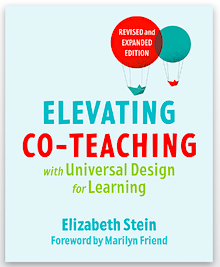How UDL Can Help Us Elevate Our CoTeaching
My story could be the story of any co-teacher in any school. Co-teachers all over share a sense of solidarity. We are all connected through our memories of successful co-teaching partnerships and – alas – our recollections of far too many unbalanced, inequitable co-teaching experiences.
In solidarity, we know we are not alone when we experience common challenges. Examples of these challenges include:
- Creating and sustaining relationships.
- Participating in meaningful co-planning time.
- Engaging as an active participant throughout all phases of instruction.
My first co-teaching experience (just over two decades ago) ended up being a great success, but it didn’t start out that way. It began as the wildest roller coaster ride imaginable. There were unpredictable highs and lows – a serious range of heart pounding and energy boosting fear balanced by some thrilling joy. Throughout it all, I was always compelled to get back on the ride, buckle up again, and experience it come what may.
Thinking about the students was my driving force. Their needs fed my passion for co-teaching. They needed ME! They needed a co-teacher who would advocate for equitable learning environments and activate their abilities to learn alongside their same-aged peers in the general classroom. And boy, was I up for that!
At a very early point in my co-teaching career (circa 2002), I was optimistic (and still am, thankfully). I thought that showing up in the classroom with the exuberance, passion, and pedagogical knowledge to co-teach would be met with open arms. I don’t have to tell you what happened next, but just for the record, let’s review.
The reality of teaching with various co-teachers was sometimes a rough ride. I co-taught in classrooms where I felt free to contribute my style, strategies, and voice. But I also experienced the twists, flips, and flops of co-teaching in classrooms where I felt stunted and stifled. In those cases, I felt forced to adjust my actions to fit in, leaving me in that all too familiar “helping teacher” role.
My stomach drops just writing about it here. It was a visceral sensation of frustration and fear. Fear that I was not doing enough for the students. Frustration as I struggled to make time to teach them the strategies they needed. Fear of what would happen if I spoke up for my role as a special educator in the moments of class time. I endured many a sleepless night as I planned for the next day with the solution-seeking mindset that kept me going.
Some Things That Kept Me Strong
Three things kept me strong and guided me to be resilient throughout the years. The first was journaling. During my co-teaching years, I always kept a journal. Journaling came easy for me – it was something I have been doing since I was ten years old. It’s been my safe space where I think through experiences with a determination to figure out solutions.
The second strength-giver was to approach and embrace co-teaching as an ongoing professional growth experience – not just an assignment or a job that would never change. Thankfully, there were many occasions where my co-teacher and I were in sync and experienced the thrill of rolling with the ups and downs together. Looking back I can see that – whether they were great or far from great – each co-teaching experience resulted in my own personal and professional growth. Clearly, how we define the meaning of “co” makes all the difference.
Most Important: I Embraced UDL
My third and most important step in maintaining my passion for co-teaching was my decision to explore and apply the powerful principles embedded in the Universal Design for Learning (UDL). As I explored UDL, it became clear that it was the key that would open the door to resolving all my co-teaching puzzles.
My journal began to fill up with my understandings and aha moments as I pursued UDL’s design elements and saw the pieces fall into place in my classroom practice. Those early journal entries eventually became the first edition of my book Elevating Co-teaching with Universal Design for Learning (CAST, 2016).
The best part of embedding UDL with co-teaching was the ongoing learning process that results in a commitment to personal and professional growth in partnership with others. My attitude and tenacity seamlessly aligned with UDL where, I discovered, learning has no limits!
Here’s a UDL Refresher
Check out this quick video and related resources from CAST, the home of Universal Design for Learning. See the current guidelines here. If you’d like to dig deeper, read this article from Harvard Ed Magazine, “How a little idea called Universal Design for Learning has grown to become a big idea — elastic enough to fit every kid.”
I continued to share and learn with colleagues across the nation. My own doctoral research further grounded me in the natural ways UDL strengthens co-teaching practices. Seven years later, after much teaching, coaching and consulting, I’ve taken all I’ve learned along the way and written a second edition of Elevating Co-teaching (CAST, 2023).
It continues to share my belief that co-teaching is an experience and not an assignment. Co-teaching is not a daily chore carried out from the “second position” with a checklist to be completed. It is an organic experience that embraces an increased self-awareness that naturally unfolds in partnership with others.
How does this happen? UDL provides the structure and mindset to transform our challenges into opportunities to cultivate those relationships, structure co-planning time, and engage in meaningful instructional processes that ultimately result in safe and supportive learning environments.
A Bit about the Book
The book moves in a natural progression. Co-teachers enter Part 1 of the book to learn key ideas that will ground them before moving forward into partnerships. Part 1 provides a common language as co-teachers branch out their involvement in the classroom. Once grounded (Part 2), co-teachers can explore specific strategies that will guide them to make the most of their co-teaching practice through relationships and instruction. The movement of teaching and learning flows into Part 3 where co-teachers branch out even further into relationships with administrators and the school community.
My hope is that the book will serve as a go-to resource for co-teachers who want to strengthen their personal views and strategic moves in partnership with all learners in their classrooms. As I write in closing: “The greatest part about coming to the end of this [revised and expanded edition] is that there really is no end.” It is the beginning of you acknowledging and embracing your own co-teaching roller coaster ride!

Elizabeth is also the author of Two Teachers in the Room: Strategies for Co-teaching Success (Routledge, 2017) and other articles and publications , including her long-running MiddleWeb column. You can follow Elizabeth on Twitter @ElizabethLStein and visit her website at https://www.steinelizabeth.com/.
































